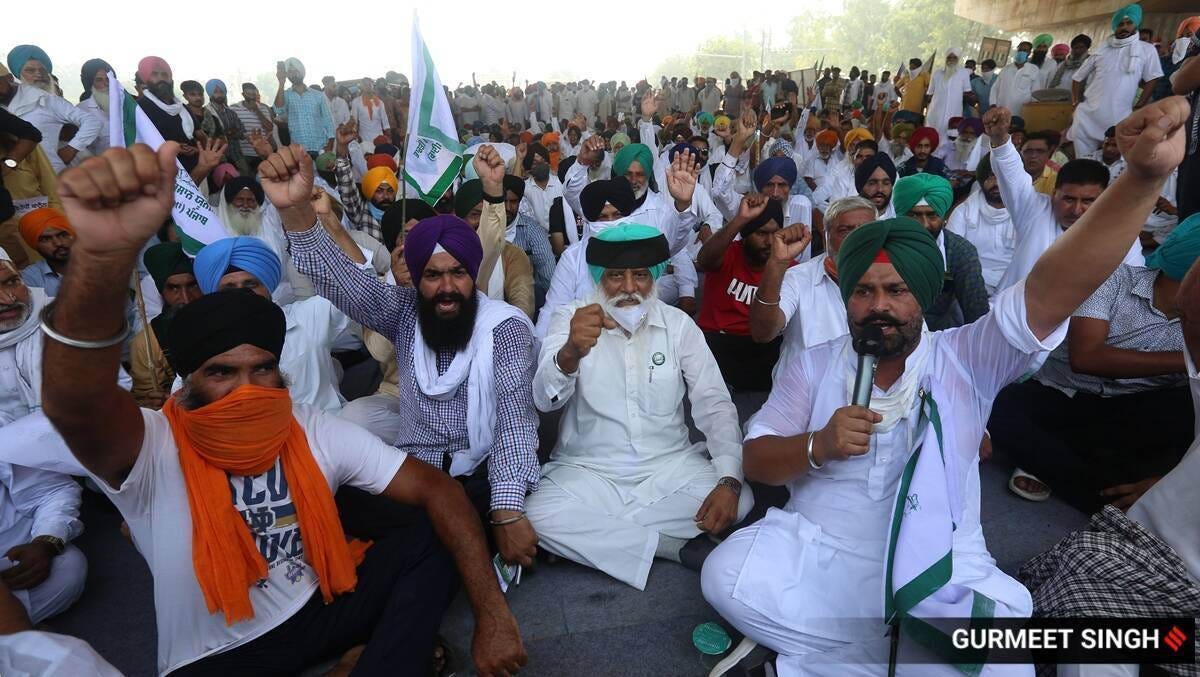Good morning! This edition of the newsletter gives you updates on the Punjab protests against farming laws, and COVID and vaccines, along with other issues like postpartum depression, the changed J&K land laws, and worsening air pollution.
Rural

Photo source: The Indian Express
Following the protests against the Center’s farmer laws, members of the All-India Kisan Sangharsh Coordination Committee (AIKSCC) and leaders of farmer unions of Punjab, Haryana, Maharashtra and other states have included a countrywide road blockade on the 5th of November. The Centre had last weekend also suspended movement of goods trains to Punjab, which was extended by four more days on Monday.
The Union Cabinet has also ruled to not release the Rural Development Fund (RDF) of more than Rs 1000 crore to Punjab, claiming mismanagement of funds and perhaps even due to the farm laws. Punjab has urged the Centre to review the same as the move would negatively impact the rural development works in the state.
The Center changed laws in the Union Territory of Jammu and Kashmir under the Jammu and Kashmir Reorganisation Act 2019, which allows outsiders to buy land in J&K. While the modified J&K Land Revenue Act continues to restrict purchase of agricultural land by someone who is not an ‘agriculturist’, the Centre can now notify other categories of people to be granted rights to buy agricultural land in the future. Conversion of agricultural land to non-agricultural land can now be done with the permission of the District Collector.
After the river was stopped from the Panchana Dam in eastern Rajasthan 14 years ago, people living and farming in 47 adjoining villages in Karauli and Sawai Madhopur districts have gone without water for drinking or irrigation. Local residents say that once-cultivated land has been rendered arid due to closure of canals. This has caused a direct loss of about Rs 1,400 crore over the years. It is 80 percent full while in comparison, in 2019, the dam was less than 30 percent full.
Water experts at the UK's University of Birmingham working in Gujarat state that they have designed a low-energy and high-efficiency means of purifying water for India's rural farming communities, which could allow farmers to safely use high-saline groundwater and wastewater to grow crops. The team is also developing ways of growing special crops using the brine solution produced as a result of desalination.
The self-help groups of the National Rural Livelihood Mission - a government programme to boost rural incomes - makes loans easier to access, helping women with finances, especially educated women as those with more years of schooling receiving larger loans. These are the findings of a recent evaluation by researchers from the International Initiative for Impact Evaluation and Vrutti, a Bengaluru-based nonprofit.
Shailaja Fennell, an academic with research interests in food production, rural development and gender equality in development interventions, spoke to the Hindu about institutional change and using indigenous knowledge systems to build long-term resilience in our ecosystems. She also discussed defining requirements for a second, more sustainable, Green Revolution in India with other researchers.
The Bihar administration has started a vigil across the state to check incidences of child trafficking that have increased due to the pandemic and floods. Authorities have rescued around 300 children in the last three months and have also arrested 72 traffickers.
Environment

Photo credits: The Telegraph
The base data available for monitoring air pollution from 2016-2019 is irregular in most of the States in which the 102 cities that have been targeted for improving air quality are situated. Delhi ranks as the most polluted in particulate matter (PM2.5) average across all three years, followed by Uttar Pradesh and Bihar. Ideally, all of the cities ought to have readings from every monitor, every year.
Additionally, only half of state pollution control boards (SPCB) and pollution control committees (PCC) shared their continuous emission monitoring system (CEMS) data publicly as of October 19, 2020.
The Madhya Pradesh government has proposed to hand over acres of degraded forest (land with a canopy density of 40 percent or less) to private companies for afforestation. The area in question amounts to 37,420 square kilometres. It said that the restoration of the degraded forest land would require an investment of Rs 56,130 crore and the government would not be able to afford it on its own. The proposal, however, was mooted by the state Principal Chief Conservator of Forest and forest services chief.
The National Green Tribunal (NGT) has declared a sand-mining project held by the Bihar government in the Banka district in 2019 as “void and a nullity”. One of the reasons for this was that the two District Survey Reports cited by the state government were not drafted in accordance with the Sustainable Sand Mining Management guidelines.
This piece by Mongabay India showcases the efforts of the Rengma people in Nagaland in protecting the land through community partnerships and a reserve, The Sendenyu Community Biodiversity and Wildlife Reserve. Founded in 2001, it is one of the 407 community conserved areas (CCA) in Nagaland. However, the reserve faces challenges like crop raids by wildlife, and hunting wildlife that enters neighbouring villages, along with a lack of alternative livelihood options.
Fly ash, a highly toxic substance known for causing health and environmental problems, is a prime component in trade between India and Bangladesh. When fly ash containers fall into water bodies, they contaminate aquaculture and may leach into landmasses, leading to agricultural land and drinking water turning toxic. About 97 percent of waterway traffic from India and Bangladesh is for fly ash transportation. The cause of recurrent accidents in the area is due to the use of old vessels for transporting the ash. This year alone, five fly ash accidents have taken place in the region.
Karnataka is considering turning the Joida taluk in Uttara Kannada into a 100% organic farming region, based on sustainable agriculture practices from Sikkim, which was declared 100% organic four years ago. The government’s first organic farming policy came out in 2004, and the total certified organic area is 1.41 lakh hectares today.
The Laptev Sea is known to be the birthplace of ice, since ice forms along its coasts in the autumn before being pushed west across the Arctic Ocean to Greenland and Norway’s archipelago, where it breaks up in spring. However, this year, for the first time since records were kept, the Laptev Sea has not begun to freeze by late October. The delayed freeze is the result of an unprecedented heatwave in Siberia along with the outbreak of Arctic wildfires
Health

COVID updates:
India’s confirmed coronavirus toll has crossed 8 million yesterday, now standing at 8.09 million reported cases, with 7.37 million reported recovered.
Here’s a quick rundown of new information about COVID:
Currently, the recovery rate in India is 90.62% with more than 72 lakh recovered patients, along with a decline in average daily deaths in the last five weeks. However, with the rapid antigen tests accounting for 60% of all testing done, there could be a misrepresentation of the actual spread of the infection. Antigen tests typically detect the virus around 80% to 90% of the time, while lab-based tests detect the virus more than 95% of the time.
Soumya Swaminathan, chief scientist at the WHO, in an article published by the Hindu pointed out key lessons from the pandemic - the role of investing in public and primary healthcare, moving towards electronic and portable health records, battling an “infodemic,” and the importance of integrating social protection systems, food systems and health systems.
A study by the Imperial College London and polling service Ipsos MORI shows that the antibody responses to the virus diminish over time in a group of 365,000 randomly selected adults who tested themselves at home, implying that immunity may be finite. The decline was largest in people aged 75 and above compared to younger people.
About reinfection, a tracker maintained by BNO News, a Dutch news agency, shows that there have been 24 cases recorded of reinfection globally as of Oct. 16. Only one is shown to have died from it, but some patients have had worse symptoms the second time around.
A fledgeling ICMR study has shown the BCG vaccine to boost the immune system of senior citizens against COVID. The initial results have been promising.
Vaccine updates:
There has been much talk about a vaccine for COVID, with parties even announcing that if voted for again they would provide it free of cost. The government has also reportedly set aside 500 billion rupees ($7 billion) for the vaccination drive.
There are many reasons why this would not work, as pointed out by this article by Firstpost. One method of making the vaccine easier for all is subsidising it, similar to the LPG subsidy.
In terms of who gets the vaccine first, mortality reduction and protecting frontline workers is bound to be first priority as per Dr Vinod Paul, member of Niti Aayog and the head of a panel advising the prime minister on the country’s efforts to produce and roll-out the inoculation. The central government has also started the process of identifying around 30 crore priority beneficiaries.
Results of last-stage clinical trials by Moderna Inc and Pfizer are expected in the coming weeks, and hopes are abound for a vaccine by December itself.
Moving on to non-COVID news:
New research shows that one in four women develop postpartum depression within three years of giving birth. The findings suggest that the risk window for postpartum depression is much longer than presently known ( six months) and current screening standards are inadequate.
A Hyderabad-based NGO, Balamitra Foundation, aims to empower girls who menstruate in rural Andhra Pradesh by launching a crowd-funded project to distribute menstrual hygiene kits among girls of Classes VIII to X. Around 150 sets were distributed, consisting of biodegradable sanitary pads made from wood pulp, gel sheets, woven fabric and paper.
If you wish to donate, you can do so here.
A Bengaluru-based startup Clinikk has launched a subscription model of health coverage for those who are left in between not being covered by the Ayushman Charath scheme or being able to afford private healthcare. It combines telehealth, insurance and primary health care for a monthly subscription averaging ₹300.
The Puducherry health department is also set to launch a health insurance scheme for 2.17 lakh families not covered under the Ayushman Bharat scheme by December 2020 through MoUs with hospitals.
.LIFE
A weekly list of readings we’ve enjoyed
These Female Healthcare Workers Fighting COVID-19 in Rural India
Baoris, Bijli Swaraj and Biomass Plants: How the states are responding to climate change
When Unwell, Vampire Bats Too Practise Social Distancing: Study
Your polyester sweater is destroying the environment. Here's why
The inspired inefficiency of technology done properly | Slowdown Papers
What explains India's poor rank under the Global Hunger Index, and what are the solutions?
Land Restoration Can Profoundly Benefit People and the Environment
"Revisiting Dispossession and Loss in Kashmir" - Zanaan Wanaan
That’s it for this week! See you next time.


